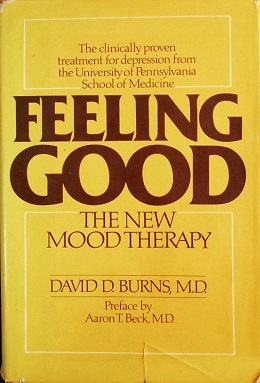Feeling Good: The New Mood Therapy
Feeling Good: The New Mood Therapy is a book authored by David D. Burns, an adjunct professor emeritus in the Department of Psychiatry and Behavioral Sciences at the Stanford University School of Medicine. The book, first published in 1980, introduces the principles of cognitive behavioral therapy (CBT), a therapeutic approach that has gained widespread acceptance in the treatment of depression and other psychological conditions. Burns' work has been influential in popularizing CBT among the general public and has been utilized as a self-help resource by millions.
Overview[edit | edit source]
Feeling Good: The New Mood Therapy outlines practical techniques for individuals to combat feelings of depression, anxiety, and low self-esteem by identifying and challenging the distorted thoughts that underlie these conditions. Burns provides readers with tools to assess their moods, identify negative thoughts, and replace them with healthier, more realistic perspectives. The book is based on the premise that changing one's thought patterns can significantly impact one's mood and overall mental health.
Content[edit | edit source]
The book is divided into several sections, each focusing on different aspects of cognitive behavioral therapy and its application to daily life. Key chapters include discussions on the identification of cognitive distortions, methods to dispute irrational beliefs, and strategies to develop a more positive outlook. Burns also includes numerous exercises and practical examples to help readers apply the concepts to their own lives.
Impact[edit | edit source]
Since its publication, Feeling Good: The New Mood Therapy has sold millions of copies worldwide and has been translated into multiple languages. It is often recommended by healthcare professionals as a supplementary resource for patients undergoing therapy for depression and anxiety. The book's accessible approach has made it a valuable tool for individuals seeking to understand and improve their mental health through self-help methods.
Criticism and Reception[edit | edit source]
While Feeling Good has been praised for its practical advice and effectiveness in helping individuals manage symptoms of depression and anxiety, some critics argue that it oversimplifies complex psychological conditions. However, numerous studies have supported the efficacy of cognitive behavioral therapy, the foundation of Burns' approach, in treating depression.
Legacy[edit | edit source]
The success of Feeling Good: The New Mood Therapy has led to the publication of several follow-up books by David D. Burns, including The Feeling Good Handbook, which expands on the concepts introduced in the original book. Burns' work continues to influence the field of psychotherapy and has contributed to the widespread acceptance of cognitive behavioral therapy as a valid and effective treatment modality.
This article is a psychology-related stub. You can help WikiMD by expanding it!
Search WikiMD
Ad.Tired of being Overweight? Try W8MD's physician weight loss program.
Semaglutide (Ozempic / Wegovy and Tirzepatide (Mounjaro / Zepbound) available.
Advertise on WikiMD
|
WikiMD's Wellness Encyclopedia |
| Let Food Be Thy Medicine Medicine Thy Food - Hippocrates |
Translate this page: - East Asian
中文,
日本,
한국어,
South Asian
हिन्दी,
தமிழ்,
తెలుగు,
Urdu,
ಕನ್ನಡ,
Southeast Asian
Indonesian,
Vietnamese,
Thai,
မြန်မာဘာသာ,
বাংলা
European
español,
Deutsch,
français,
Greek,
português do Brasil,
polski,
română,
русский,
Nederlands,
norsk,
svenska,
suomi,
Italian
Middle Eastern & African
عربى,
Turkish,
Persian,
Hebrew,
Afrikaans,
isiZulu,
Kiswahili,
Other
Bulgarian,
Hungarian,
Czech,
Swedish,
മലയാളം,
मराठी,
ਪੰਜਾਬੀ,
ગુજરાતી,
Portuguese,
Ukrainian
Medical Disclaimer: WikiMD is not a substitute for professional medical advice. The information on WikiMD is provided as an information resource only, may be incorrect, outdated or misleading, and is not to be used or relied on for any diagnostic or treatment purposes. Please consult your health care provider before making any healthcare decisions or for guidance about a specific medical condition. WikiMD expressly disclaims responsibility, and shall have no liability, for any damages, loss, injury, or liability whatsoever suffered as a result of your reliance on the information contained in this site. By visiting this site you agree to the foregoing terms and conditions, which may from time to time be changed or supplemented by WikiMD. If you do not agree to the foregoing terms and conditions, you should not enter or use this site. See full disclaimer.
Credits:Most images are courtesy of Wikimedia commons, and templates, categories Wikipedia, licensed under CC BY SA or similar.
Contributors: Prab R. Tumpati, MD

